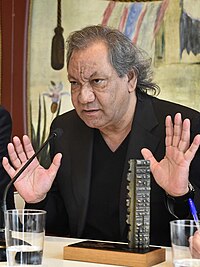Tony Gatlif
Tony Gatlif | |
|---|---|
 Tony Gatlif in 2016 | |
| Born | Michel Dahmani 10 September 1948 |
| Occupation(s) | Film director, producer, screenwriter, actor, composer |
Tony Gatlif (born as Michel Dahmani, 10 September 1948) is a French film director of Romani ethnicity who also works as a screenwriter, composer, actor, and producer.[1]
Personal
Gatlif was born in Algeria of Pied noir ancestry.[2] After his childhood there, Gatlif arrived in France in 1960 following the Algerian War of Independence.
Career
Gatlif struggled for years to break into the film industry, playing in several theatrical productions until directing his first film, La Tête en ruine, in 1975. He followed it with the 1979 La Terre au ventre, a story of the Algerian War of Independence.
Since the 1981 film Corre, gitano, Gatlif's work has been focused on the Romani people of Europe, from whom he partially traces his descent.
After making Gaspard et Robinson in 1990, Gatlif spent 1992 and 1993 shooting Latcho Drom, which was awarded numerous prizes. This feature-length musical film, often mislabelled as a documentary, deals with gypsy culture throughout the world around the theme of their music and dance. For Vincent Ostria, then journalist at the Cahiers du Cinéma, it was "the most genuine film of the year (1993 editor's note)." A year later, Gatlif brought the world of the author J. M. G. Le Clézio to the screen in Mondo (1994).
His 2004 film Exils, won the Best Director Award at the 2004 Cannes Film Festival.[3] His film Transylvania also premiered at Cannes in May 2006.[4]
Filmography
Screenwriter
- La Rage au poing (1975)
Director and screenwriter
- La Tête en ruine (1975)
- La Terre au ventre (1978)
- Corre gitano (1981)
- Canta gitano (1981)
- Les Princes (1982)
- Rue du départ (1985)
- Pleure pas my love (1989)
- Gaspard et Robinson (1990)
- Latcho Drom (1993)
- Mondo (1995)
- Gadjo dilo (1997)
- Je suis né d'une cigogne (1998)
- Vengo (2000)
- Swing (2001)
- Exils (2004)
- Transylvania (2006)
- Korkoro (2009)
- Indignados (2012)
- Geronimo (2014)
- Djam (2017)
- Tom Medina (2021)
References
- ^ "Tony Gatlif".
- ^ "Tony Gatlif en terre d'asile". RFI Musique (in French). 2004-09-02. Retrieved 2018-02-08.
- ^ "Festival de Cannes: Exils". festival-cannes.com. Retrieved 2009-11-30.
- ^ "Festival de Cannes: Transylvania". festival-cannes.com. Retrieved 2009-12-18.
External links
- 1948 births
- Living people
- French film directors
- Cannes Film Festival Award for Best Director winners
- Georges Delerue Award winners
- Algerian emigrants to France
- French people of Kabyle descent
- Romani film directors
- French Romani people
- Film directors from Algiers
- Kabyle people
- French male stage actors
- French male film actors
- Romani in Algeria
